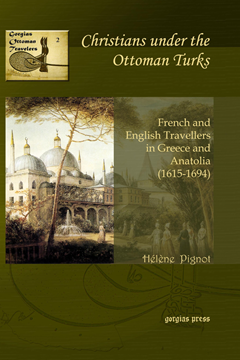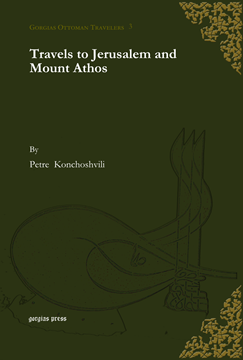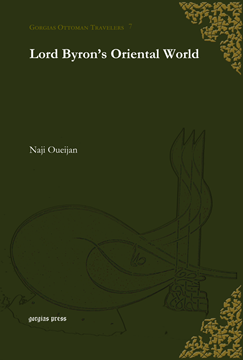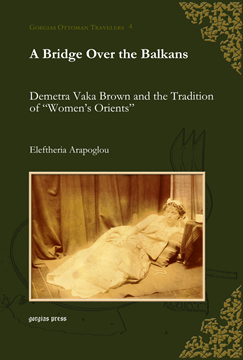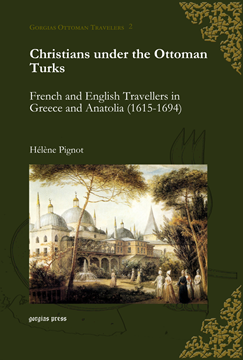Gorgias Ottoman Travelers
This series explores the experiences of travelers in Greece, Turkey, Mesopotamia, the Levant, and Egypt as reflected in their personal writings and memoirs. Analyzed by present-day scholars, these materials span the past two centuries and include historical studies as well as first-hand descriptions.
Christians under the Ottoman Turks
French and English Travellers in Greece and Anatolia (1615-1694)
Series: Gorgias Ottoman Travelers 2
ISBN: 978-1-4632-0591-1
In the 17th century Britons left their country in vast numbers - explorers, diplomats, ecclesiastics, merchants, or simply “tourists.” Only the most intrepid ventured into the faraway lands of the Ottoman Empire. Their travel narratives, best-sellers in their day, provide an entertaining but also valuable testimony on the everyday life of Orthodox Christians and their coexistence with the Turks. Greek Christians, though living under the Ottoman yoke, enjoyed greater religious freedom than many of their brothers in Christian Europe. The travelers’ intellectual curiosity about Greece opened a window on the Orthodox Church, and paved the way for future dialogue.
$106.00 (USD) $63.60 (USD)
Travels to Jerusalem and Mount Athos
Series: Gorgias Ottoman Travelers 3
ISBN: 978-1-4632-0418-1
An account by Archpriest Petre Konchoshvili of his travels to Jerusalem and Mount Athos in 1899, dealing with the relations between the Georgians, Greeks and Russians in the Holy Land.
$147.00 (USD) $88.20 (USD)
Lord Byron’s Oriental World
Series: Gorgias Ottoman Travelers 7
ISBN: 978-1-4632-0157-9
The book is a collection of eleven articles written by the author about Lord Byron’s personal and literary involvement in Oriental life and creativity. Byron’s genuine Oriental scholarship provides the platform upon which the articles are based. The authentic images of the East and the West in Byron’s Oriental tales and some of his major works, Don Juan and Childe Harold’s Pilgrimage, are analyzed to expose the influences of both worlds on his personal life and career.
$167.00 (USD) $100.20 (USD)
A Bridge Over the Balkans
Demetra Vaka Brown and the Tradition of “Women’s Orients”
Series: Gorgias Ottoman Travelers 4
ISBN: 978-1-59333-655-4
This critical study of Demetra Vaka Brown, one of the most significant Greek American writers of the turn of the last century, is framed within the fields of “Orientalism” and cultural studies. At once a white female and a Greek immigrant from the Ottoman Empire, she worked as a writer in the United States, publishing in English and contributing her work to mainstream publications. The book presents the identity politics of Vaka Brown, recovering the discursive techniques in her identification processes and assessing the significance of her agency in the context of the themes and preoccupations of Orientalism.
$168.00 (USD) $100.80 (USD)
Letters from a Distant Shore
The Journal of Sarah Ann Breath
Edited by E. Allen Richardson
Series: Gorgias Ottoman Travelers 1
ISBN: 978-1-59333-783-4
In 1849, within days of her marriage to missionary printer Edward Breath, Sarah Ann Breath joined her husband to begin a four month journey to Oroomiah (modern Urumia), Persia. Her narrative, written in a highly descriptive flowing prose, describes the journey by sea, steamer and caravan to a Nestorian community. Breath’s journal pays careful attention to the Nestorian, Assyrian, and Kurdish communities she encountered. For Breath, the journey would transform her sensibilities, challenge her awareness of cultural differences and plunge her into a world whose dangers and opportunities she could never have imagined.
$151.00 (USD) $90.60 (USD)
Christians under the Ottoman Turks
French and English Travellers in Greece and Anatolia (1615-1694)
Series: Gorgias Ottoman Travelers 2
ISBN: 978-1-59333-922-7
In the 17th century Britons left their country in vast numbers - explorers, diplomats, ecclesiastics, merchants, or simply “tourists.” Only the most intrepid ventured into the faraway lands of the Ottoman Empire. Their travel narratives, best-sellers in their day, provide an entertaining but also valuable testimony on the everyday life of Orthodox Christians and their coexistence with the Turks. Greek Christians, though living under the Ottoman yoke, enjoyed greater religious freedom than many of their brothers in Christian Europe. The travelers’ intellectual curiosity about Greece opened a window on the Orthodox Church, and paved the way for future dialogue.
$162.00 (USD) $97.20 (USD)

